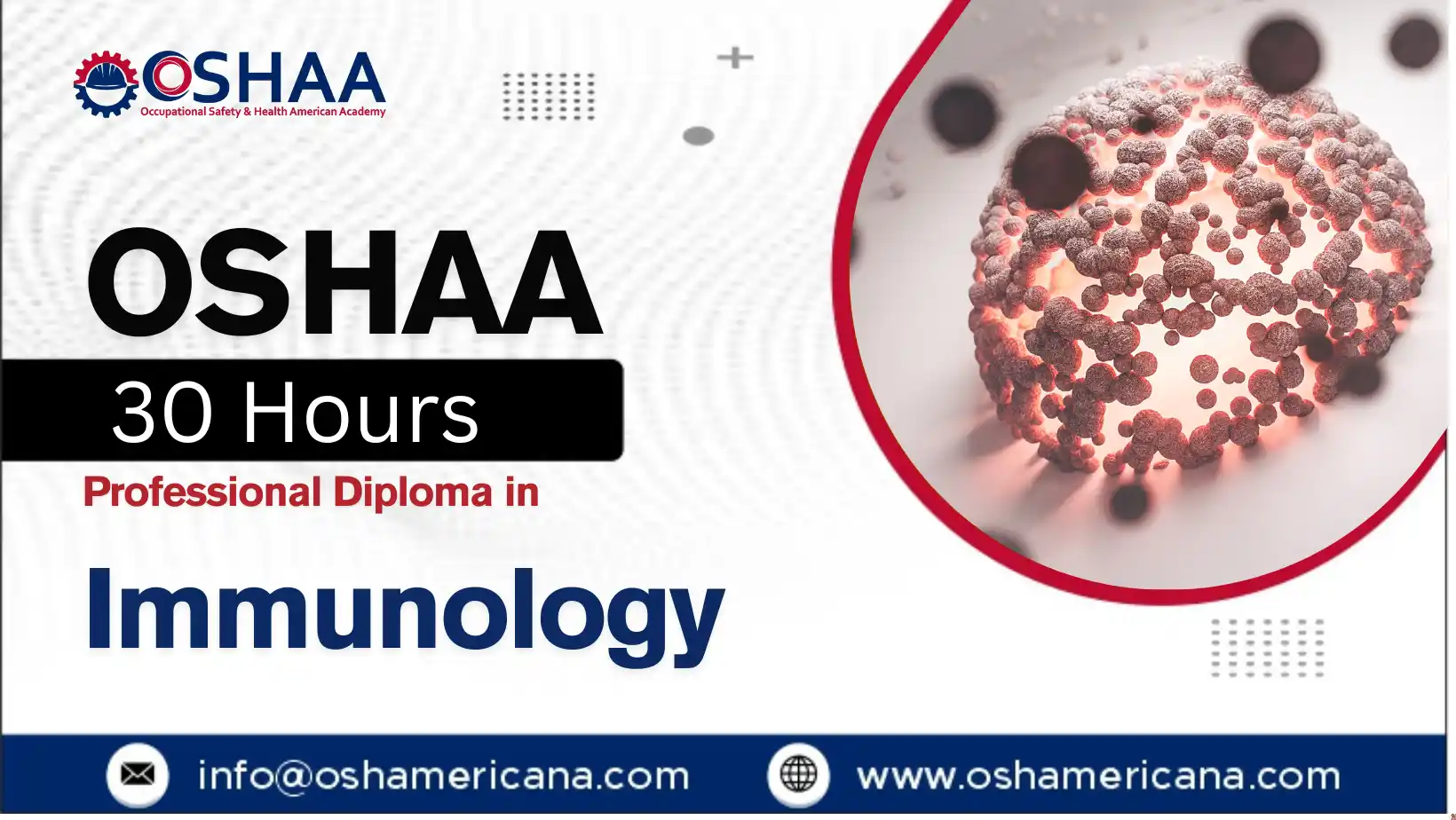Advance Your Knowledge with Diploma in Immunology
The immune system is one of the most complex and vital systems in the human body, responsible for defending against disease and maintaining overall health. As science continues to uncover the intricate mechanisms behind immune responses, there is a growing demand for professionals who possess a deep understanding of immunological principles. The OSHAA 30-Hours Professional Diploma in Immunology is designed to meet this demand by offering comprehensive, professionally structured training based on current scientific knowledge and UK professional standards.
This diploma provides participants with foundational and applied knowledge in immunology, exploring both the basic biological components and the clinical relevance of immune system function. Delivered over 30 structured hours, the course is suited for those seeking to expand their understanding of immunological science in contexts such as healthcare, research, pharmaceuticals, and biotechnology.
Participants will gain insights into how the immune system detects and combats pathogens, how immune responses are regulated, and the implications of immunological disorders. From vaccine development to autoimmune conditions and immunotherapies, this course offers relevant, career-focused content designed to enhance both theoretical and practical competencies.
The OSHAA 30-Hours Professional Diploma in Immunology is designed with flexibility, relevance, and professional impact in mind. The curriculum is curated by subject matter experts and reflects the latest developments in immunological science. It allows participants to learn at their own pace while gaining a structured and recognised qualification.
The OSHAA 30-Hours Professional Diploma in Immunology equips participants with a robust foundation in a vital and evolving scientific field. With comprehensive content, flexible delivery, and a focus on applied knowledge, this course prepares professionals to navigate the growing demands of modern healthcare and research with confidence and competence.
OSHAA 30-Hours Professional Diploma in Immunology
Study Units
Learning Outcomes
Introduction to the Immune System and Basic Terminology (3 Hours)
- Define key immunological terms and concepts
- Understand the fundamental purpose and structure of the immune system
- Differentiate between innate and adaptive immunity
- Identify the major components involved in immune responses
Cells and Organs Involved in Immunity (3 Hours)
- Describe the roles of primary and secondary lymphoid organs
- Explain the function of immune cells including macrophages, dendritic cells, lymphocytes, and natural killer cells
- Understand the interaction between immune cells and tissues
- Recognise the organisation of the immune system in maintaining homeostasis
Innate Immune Responses and First-Line Defences (4 Hours)
- Explain the components and mechanisms of the innate immune system
- Identify physical, chemical, and cellular barriers to infection
- Describe the role of pattern recognition receptors (PRRs) and cytokines
- Understand the process of inflammation and its immunological relevance
Adaptive Immunity: T-Cells, B-Cells, and Antibodies (6 Hours)
- Understand the development and activation of T-cells and B-cells
- Describe the processes of clonal selection and differentiation
- Explain antibody structure, types, and functions
- Explore the interaction between cellular and humoral immune responses
- Identify mechanisms of immune regulation and tolerance
- Discuss the role of adaptive immunity in infection control and long-term protection
Antigen Recognition, Processing, and Presentation (3 Hours)
- Understand how antigens are recognised by immune cells
- Describe the roles of Major Histocompatibility Complex (MHC) molecules
- Explain the antigen processing pathways for MHC class I and II
- Analyse how antigen presentation triggers adaptive immune responses
Immunological Memory and the Principles of Vaccination (5 Hours)
- Define immunological memory and its role in long-term immunity
- Differentiate between primary and secondary immune responses
- Explain the basis of vaccine-induced immunity
- Understand various types of vaccines and their mechanisms
- Evaluate the public health impact of vaccination programmes
Autoimmunity and Hypersensitivity Reactions (4 Hours)
- Describe the mechanisms leading to autoimmune diseases
- Identify common autoimmune conditions and their immune basis
- Classify the four types of hypersensitivity reactions
- Understand immune system overreactions and their clinical consequences
Immunodeficiency Disorders and Clinical Implications (2 Hours)
- Differentiate between primary and secondary immunodeficiencies
- Recognise clinical signs associated with immunodeficient states
- Understand the diagnostic approach and basic treatment strategies
- Explore the impact of immunodeficiency on infection risk and immune function
Course Benefits – OSHAA 30-Hours Professional Diploma in Immunology
- Develop a comprehensive understanding of how the immune system functions in health and disease
- Gain insight into the mechanisms of immune responses, including innate and adaptive immunity
- Strengthen the ability to interpret and apply immunological concepts in clinical and research settings
- Acquire up-to-date knowledge relevant to emerging fields such as immunotherapy, vaccine development, and autoimmunity
- Improve professional competence in biomedical, healthcare, and laboratory roles
- Build a strong foundation for further study in immunology, infectious disease, or molecular biology
- Enhance critical thinking and scientific literacy related to immune system disorders and treatments
- Learn about current immunodiagnostic techniques used in laboratories and clinical practice
- Benefit from a flexible and structured learning experience designed to fit around professional commitments
- Receive a recognised professional diploma that supports continuous professional development (CPD) and career progression in health and science sectors
This course is ideal for participants seeking to build or expand their knowledge of the immune system and its role in health, disease, and medical intervention. It is particularly suited to individuals working in, or aspiring to enter, the fields of healthcare, biomedical science, research, and life sciences.
This diploma is suitable for:
- Participants in clinical, laboratory, or healthcare roles looking to strengthen their immunology knowledge
- Professionals involved in vaccine development, diagnostics, or pharmaceutical sciences
- Individuals preparing for advanced study in medicine, microbiology, molecular biology, or pathology
- Researchers and technical staff working in immunology-related fields
- Public health professionals seeking to understand immune responses and vaccination programmes
- Educators and science communicators requiring accurate, current immunological insights
The course is designed to support both academic advancement and practical application, making it valuable for participants across multiple sectors of science and healthcare.







